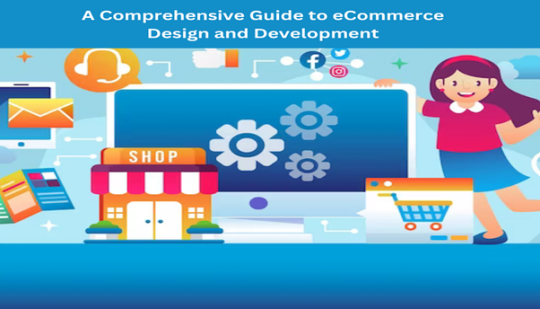#B2B eCommerce website
Explore tagged Tumblr posts
Text

The Shopify Wholesale platform simplifies selling to bulk buyers by providing customizable pricing, exclusive access for wholesalers, and streamlined order management. It's perfect for scaling your business efficiently while catering to B2B clients.
0 notes
Text
Enhance Your Online Sales with Expert B2B eCommerce Website Development Services
Are you in need of professional B2B eCommerce website development? Our group is skilled in developing unique, scalable solutions that meet your company's demands. Our expert services can help you improve user experience, optimize processes, and increase online sales. Request a consultation with us right now!
#B2B eCommerce website development#B2B eCommerce website#website development service#Expert B2B eCommerce Website#wordpress website build
0 notes
Text
A Comprehensive Guide to eCommerce Design and Development.

In the ever-evolving digital landscape, eCommerce has become the cornerstone of modern business. The success of an online store hinges not only on the quality of products or services but also on the user experience provided by its design and development. In this comprehensive guide, we will explore the crucial elements of eCommerce Design and Development that can propel your business to new heights.
#eCommerce Design and Development.#B2B eCommerce Website#Customize eCommerce Development Company#Custom eCommerce Web Design
0 notes
Text
Leading B2B e-Commerce for Industrial Products



Grateful for your continued support! 🙏💕 Sharing expert online shopping tips, your engagement means the world. Let's keep this community thriving! 🛍💻 #ThankfulThursday #OnlineShoppingTips #CommunityLove
intags #onlinemarketplaces #manufacturers #wholesaler #apparelmanufacturer #manufacturer #wholesalefashion #distributor #onlinemarketplace #wholesalers #wholesalevendors #b2b #b2bservices #ecommerceexpert #ecommercestore #ecommercebusiness #ecommercewebsite #ecommerceentrepreneur #ecommerce #ecommerceplatform #ecommercesolutions #ecommercemarketing #b2bsales #ecommercedemoda #ecommercedesign #intags #ecommercetips #b2bmarketing #intags #onlineshoppingindia
0 notes
Text
B2B Ecommerce Website Design: Tips and Trends for Success

B2B ecommerce website design is a dynamic field with trends and best practices that evolve rapidly. To succeed in this competitive landscape, businesses must stay ahead of the curve. Here are some tips and trends:
1. User-Centric Design: Focus on creating a seamless user experience (UX) with intuitive navigation and clear calls-to-action to simplify the buying process.
2. Mobile Optimization: With the increasing use of mobile devices, ensure your website is mobile-responsive for easy access and navigation on smart phones and tablets.
3. Personalization: Tailor your website to individual businesses by offering personalized product recommendations, pricing, and content based on their needs and preferences.
4. Integration with ERP and CRM Systems: Integrate your ecommerce platform with Enterprise Resource Planning (ERP) and Customer Relationship Management (CRM) systems for seamless data management and customer relationship building.
5. Security and Compliance: Implement robust security measures to protect sensitive business data and ensure compliance with industry regulations.
6. Data Analytics: Utilize data analytics to gain insights into customer behavior and preferences, enabling you to make informed decisions and optimize your website for better performance.
Stay updated with these trends and implements them to create a B2B ecommerce website that drives success for your business. The expertise of B9 Solutions in the design and development of ecommerce websites can help you achieve this.
6 notes
·
View notes
Text
Woxro: The Bright Head in the Lead of Ecommerce Development
Woxro is one of the highest level e-commerce development companies in the constantly changing digital economy. Woxro assures cutting-edge solutions for businesses with the sophisticated requirement of today's digital economy. Whether it's about B2B and B2C platforms or the most seamless integration, or simply a custom-built solution, the online business experiences get ignited through Woxro's services. Backed with the attitude of innovation and commitment towards making their clients successful, Woxro helps companies make strong digital platforms along with competitive markets. Check out these are the core e-commerce development services by which Woxro comes forward to be a preferred partner for businesses wanting to breathe new life into their online presence.
Woxro is the leading ecommerce development company in India that is located at Infopark, Koratty, Thrissur, Kerala and it is the famous shopify ecommerce development company in India, top notch woo-commerce ecommerce development company in India, professional magento ecommerce development company in India, expert medusa.js ecommerce development company in India, great big-commerce ecommerce development company in India and the relevant big-commerce ecommerce development company in Kerala, India. This company helped and supported a lot of global brands and startups in and outside India. Visit and get in touch with woxro now itself. Woxro is known by different titles such as Best eCommerce development company in India, Top e-commerce platform developers in India, Leading e-commerce website development company in India, Affordable e commerce development services in India, Professional eCommerce developers in India, Hire expert e-commerce developers from India, Custom eCommerce solutions in India, Full-stack e-commerce development company in India, Trusted e-commerce development agency in India, Innovative eCommerce solutions for businesses in India, Best e commerce website development in India, Experienced e-commerce developers in India, eCommerce app development company in India, Leading e-commerce platform development in India, Hire eCommerce developers from India, India’s top-rated e-commerce solutions provider, Custom-built e-commerce websites in India, Reliable eCommerce development services in India, Affordable e-commerce website design in India, Advanced e-commerce solutions in India, Hire top e-commerce developers in India, Secure e-commerce platform development in India, Woxro is the leading ecommerce development company in India that is located at Infopark, Koratty, Thrissur, Kerala and it is the famous shopify ecommerce development company in India, top notch woo-commerce ecommerce development company in India, professional magento ecommerce development company in India, expert medusa.js ecommerce development company in India, great big-commerce ecommerce development company in India and the relevant big-commerce ecommerce development company in Kerala, India. This company helped and supported a lot of global brands and startups in and outside India. Visit and get in touch with woxro now itself. Woxro is known by different titles such as Best eCommerce development company in India, Top e-commerce platform developers in India, Leading e-commerce website development company in India, Affordable e commerce development services in India, Professional eCommerce developers in India, Hire expert e-commerce developers from India, Custom eCommerce solutions in India, Full-stack e-commerce development company in India, Trusted e-commerce development agency in India, Innovative eCommerce solutions for businesses in India, Best e commerce website development in India, Experienced e-commerce developers in India, eCommerce app development company in India, and as the Leading e-commerce platform development in India.

B2B Platform Development
The B2B interaction is at the heart of modern commerce; it has built B2B platforms that make such interactions easy and hassle-free. B2B marketplaces help a company reach its suppliers, shortlist potential partnerships, and make the transactions all from one centralised place. Woxro's B2B platforms are wide-ranging and ensure that customers experience security, reliability, and ease of use in all business operations in order to create confidence and efficient workflows. Woxro's B2B solutions are equipped with real-time inventory management, automated processes, and advanced analytics, meaning businesses can work efficiently and have valuable relationships that last long.
B2C Platform Development
Through ease-of-use, online shops to offer products for shopping, Woxro's B2C platform development services help businesses reach their customers and interact directly with them. Designed to convert visitors into loyal customers, Woxro's B2C platforms include all the comprehensive tools for managing products, processing secure payments, and engaging in more personalized experiences for shopping. Each is optimized to give an easy, enjoyable experience to the user as businesses stretch their reach to the customer, marketing being directed, and giving an enjoyable shopping experience that creates a sale and brand loyalty.

Platform Migration
Moving out from the outdated systems to modern scalable platforms often marks the beginning for businesses that want to remain competitive. Woxro professionals successfully migrate complexly numerous business operations from less than the minimum level of disruption. Woxro takes cautious control of data migration, system configuration, and testing processes while making the move to become more distant in terms of on-premise systems to cloud infrastructure, updating legacy technology, or changing platforms. When businesses engage with Woxro, they embrace the latest technologies, realize cost savings on operations, and boost the performance of the system with business continuity and efficiency intact.
Custom-Designed Platform Development
Woxro realises that every business is unique and has custom platform development services that provide bespoke solutions for a specific goal or workflow in place. These platforms are off-the-shelf by definition, designed from the ground up to meet a precise business need. Woxro's custom solutions are scalable and adaptive, allowing businesses to implement proprietary features, streamline workflows, and maximize flexibility. About Woxro's customization innovation integration: It ensures that the platforms continue to grow with the business and, thus, become an excellent basis for long-term growth as well as a competitive edge in the market.
CMS Integration
The integration of a content management system with your e-commerce platform has vast benefits within the operation, ranging from effective product management to advanced SEO capabilities. Woxro's content management system integration services enable businesses to access a single, easy-to-use interface for managing product descriptions, optimizing search content for better search engine rankings, and personalising shopping experiences. CMS integration, therefore, promotes ease of updates while bringing increased online visibility and engagement from customers. CMS integration helps companies create more engaging and dynamic experiences that talk to customers to convert them.
API Integration
API integration is a necessary concept for e-commerce platforms in an interlinked digital world, integrating with third-party applications, payment systems, and other services. Woxro's API integration services provide smoother interoperability between different software applications for easy information sharing and add-on features. Of course, payment gateway, CRM system, and APIs all resolve issues because their performance can grow without getting disconcerting of existing operations, Woxro ensures that. API integration makes the overall functionality and responsiveness of e-commerce platforms robust, flexible, and scalable enough to expand on further expectations.
Why Woxro for ECommerce Development?
At Woxro, you will find industry expertise, innovative technology and, above all, a client-centric approach that seeks tailored solutions for each business. Ecommerce development with Woxro's services is done to cater for the unique needs of every client so as to ensure robust, scalable solutions adapting to changing market demands. Whether it is a B2B, B2C platform, handling platform migrations, or integration with CMS and APIs, Woxro connects with technical pools of expertise in alignment with strategic insight to yield results. Businesses partner with Woxro to achieve advanced tools and custom solutions in enforcing the new path forward through their digital success.

Conclusion
Woxro e-commerce development solutions give businesses the possibility of a powerful and agile web presence. The products offered by Woxro for creating B2C growth strengthen customer engagement, streamline B2B relations, smooth migrates, and unlock API and CMS integrations that facilitate business clients' digital transformation with the platform. Equipping businesses with solutions that solve the challenges of the digital age, creating future-proof, impact-generating e-commerce, to drive business growth and success-all of these Woxro does.
#ecommerce#ecommerce development agency#ecommerce development services#ecommerce development company#ecommerce website development#ecommerce developers#web developers#web development#web graphics#web resources#shopify#woocommerce#online store#smallbusiness#websitedevelopmentcompany#search engine optimization#web design#website design#web hosting#website#social media#content creation#content creator#cms development services#cms#b2b#b2bmarketing#api integration
0 notes
Text
Maximizing Conversion Rates on Your B2B E-commerce Site: Proven Strategies and Best Practices

Today, buyers, suppliers, and manufacturers have all found viable use cases on Ecom, and businesses can connect with a wide range of people who can facilitate their sales by choosing the most suited for them among the prior. By leveraging b2b ecommerce development services, companies can streamline these connections and enhance their digital presence. Today, let us closely understand what all B2B e-commerce platforms bring and how we can boost productivity with simple strategies and maximize our conversion rates.
Importance of optimisation of B2b E-commerce sites
The relevance and benefits of E-commerce platforms for B2B businesses are huge; not only are they viable in the ways conventional E-commerce platforms are like providing a centralized platform to find, compare, and purchase products at competitive prices and facilitate international trade by enabling customers to connect with businesses, suppliers and manufacturers of all around the world just like B2B e-commerce sites like Alibaba and global sources do, but there are some socially important characteristics of B2B e-commerce platforms, which make them perform tasks even beyond these conventional needs. Let’s discuss some of these points that make B2B websites so crucial for the facilitating of businesses.
Making of the global community
When we talk of business-to-business transactions of goods, it is given that products sold and purchased on B2B e-commerce platforms are in bulk. Thus, trust and authenticity become even more important as the stakes increase. B2B e-commerce websites, through their connectivity with the internet, not only connect businesses from around the world but also take care of the authenticity and quality control of their goods plus also check on the authenticity of the sellers through various identity checks and bring further transparency to the transactions which help in making of a trustable global community of businesses, suppliers and buyers. Furthermore, B2B platforms can help businesses find suppliers who meet sustainability and ethical standards, supporting corporate social responsibility goals.
Scalability and recognition
As mentioned before, B2B e-commerce websites help connect with larger audiences and buyers from all around the world, and through optimization, a business can do immensely well at gaining recognition and trust from all around the world. This makes e-commerce even more significant for B2B firms.
Better control over the supply chain
E-commerce websites provide better control over the supply chain with advanced real-time tracking customization of orders and easy placing and cancellation of orders through fixed channels. This makes the whole process even more transparent and convenient. Some Advanced features even help businesses manage inventory more effectively, reducing stockouts and overstock situations.
Better customer experience
With the help of the algorithm, e-commerce platforms can also recommend similar products to the choice of buyers, which helps increase the sales of the suppliers and businesses and find appropriate recommendations and alternatives for their choices to help them. Furthermore, a good e-commerce platform has a very easy-to-navigate and friendly user interface that makes everything smoother and more convenient.
Meeting the needs of the dynamic marketplace of today
With the help of technology, e-commerce sites can bring out accurate statistics and data for businesses to plan better strategies to promote their business and streamline their services and products according to the needs of the customers seeking them. B2B platforms often integrate with business systems like ERP and CRM, improving data management and operational efficiency. In today’s volatile market, needs and trends are continuously evolving; hence, constant data tracking is extremely important for businesses to excel.
Automation of routine tasks
With the integration of technology in the whole trade process via e-commerce, routine tasks such as invoicing, order processing, and inventory management have become automated, saving time, effort, and manpower to do all of these, ultimately making everything more efficient and convenient.
Resilience against disruptions
During the COVID-19 pandemic, the importance of e-commerce was highlighted, as even during long periods of complete lockdowns, e-commerce helped businesses to survive and continue despite the challenges at hand. Similarly, such destruction is dealt with well with the help of e-commerce.
Considering all of these benefits, it is almost imperative for all businesses to have a viable commerce presence. Fortunately, today, B2B e-commerce website development has been democratized through various tools, facilitating its easy development and management. A business needs to have a reputable e-commerce solutions team to maximize the results they can get from these B2B e-commerce websites.
Some simple and straight strategies to maximize conversion rates on B2B e-commerce sites
Now that we know the benefits of B2B e-commerce and what it can bring to the table for flourishing businesses, it is imperative to maximize the potential it has. The internet is a vast place with endless users, and it becomes difficult for any e-commerce site to leave a mark. Hence, they need to stand out by following certain strategies that can make them a reliable choice for the customers. Let us look at some of them:
A smooth user interface
One of the most essential things in any commerce platform is how easy and smooth it is for the customers. Hence, ensuring your site is easy to navigate with a clear, intuitive menu structure is imperative. Use breadcrumb navigation and clear CTAs (Calls to Action) to guide users.
It is also essential to have mobile optimization in place and the same smooth running on mobiles. Furthermore, optimizing images, using efficient coding practices, and leveraging Content Delivery Networks (CDNs) to ensure fast page loading times will be sensible.
Enhance Product Information and gain trust
As products are intangible on the screen, it is important to have detailed descriptions and high-quality images on the e-commerce sites, along with a proper section for conveying the terms and conditions to gain the buyer’s trust. HD videos of the products and their 360-degree 3D view are also suggested. All of this increases the transparency of the product sold, and the seller’s policies increase the buyers’ faith in the product sold.
Streamline the Purchase Process
To make all the efficiencies work, it is crucial to have systems that support and make all conveniences possible. This simplifies ordering with features like bulk ordering, quick reorders, and saved shopping lists. Offer various payment options, including credit terms, invoicing, and electronic payments and provide clear and transparent pricing, including volume discounts and special offers.
Effective Marketing Strategies
To have your site noticed in the vastness of the internet, it is important to have effective marketing strategies in place to have it stand out, get noticed, and reach more and more people. Optimize your site for search engines to attract organic traffic and Use Pay-Per-Click (PPC) advertising to target specific buyer personas. Content and email marketing are also viable techniques for marketing the e-commerce platform and increasing conversion rates.
Leveraging Data and Analytics
Leveraging data and analytics allows businesses to optimize their e-commerce sites continually. Conducting A/B testing on different site elements, such as headlines, calls to action, and product pages, helps determine the most effective strategies. User behavior analysis with analytics tools identifies bottlenecks in the conversion funnel, enabling targeted improvements. Conversion rate optimization (CRO) practices based on data insights and user feedback lead to ongoing enhancements.
Building Trust and Credibility
Building trust and credibility is essential for encouraging conversions. Ensuring site security with HTTPS, SSL certificates, and compliance with industry standards protects customer data. Providing clear return and refund policies reduces buyer hesitation while offering multiple support channels, including live chat, phone support, and a comprehensive FAQ section, enhances customer confidence.
Utilizing Technology and Automation
Utilizing technology and automation streamlines operations and improves efficiency. Integrating Customer Relationship Management (CRM) systems helps manage customer relationships and streamline communication. Marketing automation tools personalize outreach and manage lead nurturing campaigns, while robust inventory management systems ensure product availability and timely fulfillment.
Post-Purchase Engagement
Engaging customers post-purchase helps build loyalty and encourage repeat business. Sending follow-up emails to thank customers, confirm orders, and provide shipment tracking keeps customers informed and appreciated. Implementing loyalty programs rewards repeat purchases and long-term customers. Soliciting customer feedback post-purchase shows that their opinions are valued and helps improve products and services.
Conclusion
In the competitive B2B e-commerce landscape, having effective strategies to maximize the outcomes of the opportunity that the internet can provide through commerce is imperative. If utilized well, there have been cases of massive successes that have come out of e-commerce. Implementing headless ecommerce solutions can offer businesses the flexibility to create unique front-end experiences while separating them from the back-end systems, allowing for greater customization and faster updates. However, it does come with its challenges, such as increased complexity in development and management. It is clear that in the coming times, the scope of B2B e-commerce will only increase and become even more relevant and significant; hence, businesses need to have their own e-commerce presence in place today and start building it as early as possible. With these proven strategies, B2B e-commerce can become an instrumental domain for everyone involved.
Originally Published At — Maximizing Conversion Rates on Your B2B E-commerce Site: Proven Strategies and Best Practices
#b2b ecommerce development services#b2b ecommerce website development#b2b ecommerce web development#b2c ecommerce website development
0 notes
Text
Why Website Development is Key to Business Success in the Digital Era
In today's digital world, a well-designed website is essential for business success. It serves as the foundation of your online presence, offering a platform to showcase products, services, and company values. A professional website enhances credibility, making your business appear trustworthy and accessible to potential customers.
Website development goes beyond aesthetics—it's about functionality, user experience, and optimization. A responsive, fast-loading website improves customer engagement and retention, while integrated SEO strategies help your business rank higher on search engines, increasing visibility.
Additionally, websites provide an easy way to collect customer data and feedback, helping businesses make informed decisions and refine their marketing strategies. For any business looking to thrive in the digital era, investing in quality website development is not just an option—it’s a necessity for long-term growth and success.
0 notes
Text

There are many factors which make Search engine optimization, a better choice for businesses. It is best for long term goals, Building brand awareness and trust, and can help you get top search engine results.
#b2b seo strategy#Local SEO agency services#Ecommerce SEO specialists#Local SEO optimization#Local SEO for businesses#local SEO services#Effective keyword research#Keyword optimization techniques#Advanced keyword research#on-page SEO practices#on page optimization checklist#elements of on page seo#technical seo strategy#website technical audit#google algorithm for seo#latest off page seo techniques#advanced link building techniques
0 notes
Text
Supercharge Your Business with Customized E-commerce Solutions

Running a business is no easy task, but having the right e-commerce solutions can make all the difference. Picture this: a smooth, hassle-free online store that practically runs itself, freeing you up to focus on growing your brand. Whether you’re catering to a loyal group of customers or breaking into new markets, the right platform can open up endless possibilities. Let’s dive into how you can level up your business with smart, tailored ecommerce strategies that fit your unique needs.
Why Ecommerce Solutions Matter
In the modern business landscape, e-commerce is no longer a luxury—it’s a necessity. Consumers expect a flawless experience from the moment they land on your website to the time they complete a purchase. Whether you’re running a B2B portal or serving individual customers, ecommerce platforms offer customizable, scalable solutions that can take your business to the next level.
With the right e-commerce platform, you can streamline your operations, manage inventory effortlessly, and provide an intuitive interface for your customers. It’s about more than just creating an online store—it’s about crafting an entire ecosystem that works seamlessly together to boost efficiency and profits.
Tailored E-commerce solutions for Every Business
Not all ecommerce solutions are created equal, and that’s where customized services come into play. The beauty of having a tailored e-commerce platform is that it can be adapted to meet your specific needs. Are you a B2B company looking to streamline operations? A specialized B2B portal allows you to manage bulk orders, negotiate prices with your clients, and offer exclusive pricing for loyal customers.
By choosing the right ecommerce solution, you can handle everything from product listing to payment gateways and customer service in one centralized location. This reduces the complexity of running an online business, allowing you to focus on what matters—delivering top-notch products and services to your customers.
Features That Make Ecommerce Solutions Shine
What sets a powerful ecommerce solution apart from the rest? Here are a few key features to look for when choosing the right platform for your business:
Scalability – As your business grows, your ecommerce platform should grow with you. A scalable solution ensures that you’re ready for increased traffic and more complex business operations.
User-Friendly Interface – An intuitive platform allows both your customers and your team to navigate with ease, ensuring that your website delivers a seamless experience.
Security – In an era where cyber threats are ever-present, a secure e-commerce solution is non-negotiable. Make sure your platform offers robust protection for both you and your customers.
Integration Capabilities – Your e-commerce platform should integrate with the tools you already use, whether it’s your CRM, email marketing software, or accounting systems.
A well-designed B2B portal will have these features baked in, ensuring that you stay ahead of the curve in this competitive landscape.
E-commerce Solutions Boost Efficiency and Sales
E-commerce platforms are more than just online stores—they’re powerful business tools that drive growth. A good ecommerce solution can automate time-consuming tasks such as inventory management, order processing, and even customer support, freeing up your time for more strategic work.
When it comes to increasing sales, ecommerce solutions can help you personalize the shopping experience. From offering special discounts to loyal customers to recommending products based on past purchases, your platform can play a crucial role in boosting conversions. Personalized experiences not only lead to higher sales but also to more satisfied, repeat customers.
Optimizing B2B E-commerce: The Future is Now
The rise of B2B e-commerce has opened new doors for businesses looking to connect with their clients in more dynamic ways. Traditional B2B companies are moving toward online platforms to manage client relationships, process bulk orders, and offer customized solutions. Whether your business is focused on wholesale or providing services to other companies, an effective B2B e-commerce platform allows for smoother transactions, better communication, and higher levels of satisfaction.
The biggest advantage of B2B e-commerce? It opens up a world of opportunities. With an efficient B2B portal, you can provide tailored experiences for each client, track their preferences, and offer personalized deals. Moreover, it streamlines purchasing processes, making it easier for clients to do business with you.
Future-Proofing Your Business with Supreme Technologies
The ecommerce landscape is constantly evolving, and your business needs a solution that can adapt to these changes. At Supreme Technologies, we pride ourselves on providing cutting-edge ecommerce solutions that meet the needs of both B2B and B2C businesses. We understand the unique challenges that come with running an online store, and we’re here to make your life easier.
From building fully customized e-commerce platforms to offering ongoing support and optimization, we’ve got you covered. Our team of experts is dedicated to helping you create a seamless online experience that will keep your customers coming back for more.
Ready to Take Your Business to the Next Level?
The future of business is online, and having the right ecommerce solutions can make all the difference. Whether you’re looking to launch a new online store or optimize an existing one, our team at Supreme Technologies is here to help. Let us build a platform that’s not only powerful and scalable but also tailored to your specific business needs.
Don’t wait—get started with our state-of-the-art ecommerce solutions today. Visit our website at Supreme Technologies to learn more and take the first step toward transforming your business with e-commerce.
#Ecommerce Solutions#B2B Portal#Enterprise Solutions#ecommerce website development#best ecommerce web development services
0 notes
Text
Why Odoo E-commerce Is the Best Choice for Customizable Online Stores
The e-commerce landscape undergoes rapid transformations, demanding a suitable foundation. Odoo E-commerce is a powerful, flexible solution for businesses. It offers a customizable, integrated platform. Odoo has tools for both B2B and B2C online stores, meeting their unique needs. This article explains why Odoo E-commerce is the best for B2B online stores with customizations.

Seamless integration with other Odoo apps
One of Odoo's standout features is its seamless integration with other Odoo apps. If your business uses various software to manage operations, Odoo can help. Its integrated ecosystem will simplify your workflow. The platform has modules for CRM, inventory, and accounting. Your Odoo e-commerce unites all business operations in harmony. This integration cuts the need for many third-party apps. It provides a single interface to manage your store.
Extensive customization options.
Unlike many other e-commerce platforms, Odoo offers extensive customization options. Businesses can tailor their online store to meet specific needs, including the UI, product pages, and checkout process. This flexibility is vital for B2B e-commerce, which has a complex sales process and needs unique functions. Odoo lets you create a custom e-commerce site that will match your brand and business needs.
Integrated Payment Solutions Payment processing is a critical component of any online store. Odoo supports integration with various payment gateways, including Odoo Stripe integration and PayPal. This ensures customers can choose from many payment options, improving their shopping experience. For B2B transactions, payments can be complex and involve large sums. So, a reliable and versatile payment system like Odoo is essential.
Robust B2B e-commerce capabilities
Odoo is ideal for B2B e-commerce. Its features meet the unique needs of business customers. Odoo's B2B e-commerce has it all: personalized pricing, bulk ordering, advanced user management, and detailed reporting. These features let businesses manage large accounts and negotiate prices, and they also streamline ordering. So, Odoo is a preferred choice for B2B companies.
Scalability and Future-Proofing
As your business grows, so too will your e-commerce needs. Odoo helps your business grow. It adds features, expands markets, and handles traffic without major changes. Odoo's scalability makes it a solution for today. It can grow with your business. It will keep your e-commerce in Odoo competitive and efficient as your needs change.
Conclusion
Odoo E-commerce provides a platform that adapts to various business needs. Odoo can help you succeed. It can integrate with existing systems, customize your store, or serve B2B customers. It has the tools and flexibility to do so. Odoo is the best choice for businesses. Its unified strategy and robust business-to-business tools create a tailored, streamlined website. Smooth payments support this.
#devintellecs#odoo e commerce#odoo e commerce service#odoo service#odoo b2b e commerce#odoo ecommerce websites#odoo stripe integration#odoo ecommerce b2b#odoo for ecommerce#ecommerce in odoo#odoo ecommerce app#odoo website ecommerce
0 notes
Text
#artificial intelligence#ai art#ai generated#ai artwork#ai girl#ai image#chatgpt#technology#inteligência artificial#artificialjewels#ai technology#ai tools#nvidia#artificially generated#artificial grass#ecommerce website development#web development#game development#software development#mobile app development#self development#saas technology#saas#b2b saas#saasmarketing#saas software#dataanalytics#businessintelligence#analytics#bigdata
0 notes
Text
Leading B2B e-Commerce for Industrial Products
🍽 Kitchen Clean-Up Tips 🧼
CleanKitchen: Keep your kitchen clutter-free for a peaceful cooking experience.
CleanAsYouGo: Say goodbye to a mountain of dishes by washing them as you cook!
DailyWipeDown: Swipe away those crumbs and spills for a sparkling kitchen.
OrganizedKitchen: Organize your pantry with labeled containers for a chef-worthy setup.
DeepCleanRoutine: Make your kitchen shine with a monthly deep cleaning session.
Share these tips with your foodie friends and keep your kitchen Instagram-ready! 💫 #KitchenInspiration #CleanAndCook #HomeChefHacks
0 notes
Text
What are the SEO for Shopify website strategies the experts follow?
If you are an ecommerce store owner, then you need to keep in mind that the online site has to be optimised. It is essential to get organic traffic. At the same time, it is fruitful when it comes to boosting sales. To do so, you need to adopt the right SEO strategies. And that you can do smartly with the help of the Seo for shopify websites experts. So, let’s see what vital strategies they follow for that.

Making the keyword research process more accessible and smart
The SEO for Shopify websites experts have the knowledge and understanding of the smart keyword researching process. They identify the phrases and terms that will target a particular audience. They use some of the most popular tools to find the high-intensity keywords that come with less competition. They wittily incorporate the keywords per the descriptions, meta tags, product titles, and URLs to improve the search engine ranking.

Keeping the product page fully optimised and structured
The Seo for shopify websites professionals ensure that each product page is properly structured. That is why they use keyword-enriched descriptive narrations and product titles. Besides, they use high-quality descriptive alt text and well-structured data markup, offering search engines all extra details about your service or product.

Keeping the mobile fully optimised to get success in Seo
Any professional with experience in Seo for Shopify websites gives importance to mobile shopping. That is why they choose to go for responsive themes that offer a smooth user experience facility across different devices. Thus, it also optimises the time needed for loading page, eliminates all other mobile issues, and ensures the site is entirely mobile friendly per the indexing rule.

Final say
Thus, the above said are the underlined strategies that any SEO for Shopify website experts do follow. So you can look for Shopify SEO Services from a reputed provider.
#SEO for Shopify website#SEO for Shopify websites#Shopify SEO Services#Shopify SEO#seo B2B eCommerce#Seo eCommerce Website#Shopify SEO experts#seo indexing rule#seo search engine ranking#Shopify websites experts
0 notes
Text

https://alibabaclonescriptpro.com/blog/popularity-in-alibaba-clone/
whey is alibaba clone popular in b2b marketplace and how does it work
0 notes
Text
B2B E-commerce Best Practices: Catering to the Needs of Manufacturing and Distribution
In the past years, the B2B e-commerce industry has gained a lot of trust and fame in the eyes of consumers. Now, it’s a period when the industry has set the bar so high that there’s no going back. The way the world does business with such a force of manpower is mindblowing and awestruck.

So many nations are accepting the true potential of the B2B e-commerce industry and racing towards mastery of it. Saudi Arabia is no different in this race. In fact, the way the Kingdom of Arab has flourished in the B2B e-commerce industry is commendable. It has opened the gate flooded with new opportunities for entrepreneurs worldwide.
Saudi Arabia is a country where culture and technology go hand in hand, and it has seen a significant shift in terms of the digitalisation and trade of different goods and services. Basically, Saudi Arabia’s B2B e-commerce industry is a miniature version of the global digital market where so many brands come together for a business on a broader level. It’s awestruck to know that “The Saudi Arabia freight and logistics market is expected to expand at a CAGR of 5.7% between 2023 and 2029, reaching a value of USD 33.2 billion by 2029.” source: Blueweave consulting.
Our focus is on manufacturing and distribution, discussing the specific problems and possibilities these sectors face. This blog will help you understand how your brand will adapt and triumph in Saudi Arabia’s B2B e-commerce market.
Overview of B2B E-commerce Trends in Saudi Arabia
Saudi Arabia is definitely growing with a wave of digitisation, specifically in the broad context of business-to-business (B2B) e-commerce. It mirrors the present and future of how businesses connect, transact, and work together in the Kingdom. There are a lot of B2B e-commerce trends to look out for, a few of them mentioned below.
The Impact of the Internet of Things:
Gone are the days when brands used to operate traditionally. Now, their business models are changing with respect to digital technologies. Within its B2B e-commerce sector, Saudi Arabia is aggressively integrating the latest technologies such as artificial intelligence (AI), the Internet of Things (IoT), and blockchain. These technologies are expanding operations’ performance and fundamentally changing commercial transactions.
Rise in Online Transactions:
The sharp increase in online purchasing typifies the digital wind moving throughout Saudi Arabia. Whether small or big, every business has begun to depend on digital platforms for purchasing, sales, and joint ventures. Such a trend isn’t confined to a single industry but runs through the whole B2B sector, giving a reality check to brands that are still rigid to the benefits of e-commerce.
Patterns of Business-to-Business Relationships:
The standard features that distinguish business-to-business are changing. With so many technological changes, more brands are coming together with the mindset of open communication. Collaborative platforms, cloud-based solutions, and digital communication channels make B2B interactions more flexible and responsive. The primary focus is not just on transactions but also on long-term partnerships.
Data-Driven Choices:
We often hear or read that data is the new gold, and the world is fighting over it. Obviously, data is now seen as the new currency, and Saudi Arabia’s B2B industry is no different from the whole world. Data analytics is effortlessly used by businesses to gain insights into market trends, consumer behaviour, and profitability. In such a risky B2B market, having the capacity to make calculated decisions based on data and numbers is becoming the new norm.
Specific Manufacturing and Distribution Challenges & Opportunities for Saudi B2B Commerce
Various aspects indicate the Saudi Arabian instance of B2B e-commerce in production and distribution. Many entrepreneurs face high competition, with a nation strategically developing its infrastructure and economy. Being acquainted with the subject’s complexities is important for corporations looking forward to overcoming the challenges and maximising the possibilities.
Supply Chain Complexities:
The manufacturing and distribution sectors primarily depend on intricate supply chains. In Saudi Arabia, the geographical nature of industries majorly contributes to complex supply chain networks. Coordinating the timely flow of goods from production to distribution centres requires a minimal approach, which is again often complicated by different regulatory areas and logistics challenges.
But as the government is taking transit infrastructure and logistics quite seriously, it has invested in expanding it, which is now yielding fruitful results and generating several possibilities for supply chain enterprises. Moreover, advanced technologies, such as blockchain and IoT, are an opportunity to simplify supply chains.
Brands can start with real-time tracking, and data analytics can improve visibility, boost inventory management, and reduce miscellaneous work, leading to a more agile and responsive supply chain.
Market Dynamics:
The Saudi B2B commerce market is a mosaic of various industries with different levels of needs, products, services, and preferences. Going through these problems can be overwhelming for E-commerce manufacturing brands operating in manufacturing and distribution. Understanding the market’s intricate layers and inculcating demands based on different regions and industry-specific requirements can be your magic potion for a successful brand strategy.
Modification and distribution come as important opportunities. B2B platforms that supply specific assistance that addresses the particular demands of various sectors and geographies have a stronger chance to grab market share. Establishing strong ties with local suppliers and distributors can assist a B2B platform in adapting to the peculiarities of the Saudi market.
You’ll be amased to know that recently, it was found in research that “The Saudi Arabia Ecommerce Market size is expected to grow from USD 11.83 billion in 2023 to USD 23.80 billion by 2028, at a CAGR of 15.01% during the forecast period (2023-2028). Well, one can say that these numbers are obviously high, and Saudi Arabia is surely a promising market for the e-commerce industry.
Regulatory Challenges :
While Saudi Arabia’s legal framework has begun to accommodate new technologies, it may still present difficulties for B2B e-commerce success in production and distribution. Compliance standards, import/export laws, and data security can be challenging to manage.
Proactive compliance processes can be used to gain a competitive advantage. B2B platforms that invest in resilient cybersecurity, data protection, and compliance procedures adhere to legal requirements and encourage self-assurance among partners. Partnerships with regulatory agencies and industry groups can provide data and ensure a proactive compliance strategy.
Digital Adoption:
While the digital transformation in Saudi Arabia is stepping up rapidly, some businesses in the manufacturing and distribution sectors may still be at different stages of digitalisation. Many brands are still too rigid to change and need to upskill their manpower in digital technologies, which can impede easy integration.
Saudi Arabia’s government is quite active in digitalisation and educating brands to develop e-commerce solutions. Similarly, educating your brand about the benefits of digitalisation and providing user-friendly interfaces can fill the gap in knowledge. In fact, B2B platforms that offer detailed training and support during onboarding can easily adapt to digital transformation. You can have workshops in partnership with digital training providers and can also contribute to upskilling the workforce in partner organisations.
Global Connectivity:
Being present everywhere, a feature of business-to-business interactions in manufacturing and distribution calls for dealing with multinational corporation partners, each with its own challenges, including different languages, time zones, and cultural variations.
Using technology to increase your brand’s global presence is of the utmost importance. Multilingual interfaces, real-time communication tools, and timezone-aware support systems for B2B platforms can improve communication. Furthermore, advocating culturally appropriate communication and business practices helps create better partnerships with overseas partners.
Understanding and addressing the specific challenges and taking quick action on the opportunities within the manufacturing and distribution sectors in Saudi B2B e-commerce asks for a thoroughly planned strategy. In this industry, everything keeps moving at lightning speed. By accepting the change, understanding technological innovations and market dynamics, and working towards global connectivity, businesses can overcome challenges and set themselves up for sustained growth and profitability.
Strategies for Meeting the Specific Demands of B2B Customers
B2B clients operate in a context that is divided by complicated procurement processes, large-scale transactions, and a focus on long-term relationships. Knowing and responding to clients’ specific demands is important in the profitable operation of B2B e-commerce in Saudi Arabia’s manufacturing and distribution industries.
Configurable Solutions:
B2B customers frequently ask for custom solutions that fit a particular company’s wants and needs. Developing a system that permits alternatives to products, specific pricing, and customised service packages can substantially boost the customer experience. This improves the method of purchasing and indicates attention to knowing what meets the needs of special clients.
Transparent and Negotiable Pricing:
Transparency in price structure explains clients and encourages large purchases. Trust can be built by offering a brief description of expenses and allowing for negotiating features inside the e-commerce platform. Flexible pricing strategies that take volume discounts or loyalty rewards into account can also properly inspire customer loyalty.
Easy and Sophisticated Procurement Processes:
B2B customers prioritise speed in their buying procedures. User-friendly interfaces allowing quick order placing, tracking, and administration can drastically improve the user experience. Integration with procurement systems, such as ERP (Enterprise Resource Planning) software, guarantees that the B2B platform and the customer’s internal systems communicate and exchange data in real-time.
Account Management and Customer Support:
Dedicated account managers are allocated to B2B clients in order to encourage a distinctive and dependent connection. These account managers are a point of contact for any questions, complaints, or requests for modification. Offering 24-hour customer service and clear communication channels can improve the entire customer experience. With such a small change, you’ll see a drastic change in your customer behaviour and overall attitude towards your brand.
Integration of Advanced Analytics:
B2B clients generally want thorough analytics and reporting in order to manage their expenses, evaluate the performance of acquired items, and identify possible cost reduction areas. By adding advanced analytics capabilities to the e-commerce platform, clients can get real-time data, letting them make accurate choices and maximise their procurement strategy.
Flexible Payment and Credit Options:
It happens most of the time, clients ask for extended credit terms and flexible payment methods. Henceforth, we offer a variety of payment alternatives, such as credit lines, instalment plans, and net payment periods, as well as answers to the different financial structures of B2B clients. Executing a substantial credit management system guarantees financial transparency and dependability.
Continuous Engagement and Education:
It’s obvious that clients in every kind of industry love extra care and respect, and especially B2B clients value suppliers that connect with them beyond the transactional phase. Regularly delivering knowledge about new products, industry trends, and best practices via newsletters, seminars, or dedicated portals symbolises a dedication to the customer’s accomplishment and progress. This constant involvement leads to the development of long-term, mutually beneficial partnerships.
Adaptable Solutions:
B2B clients frequently face ups and downs in demand and supply. Providing affordable and flexible solutions that support a futuristic vision with customer’s business goals or meet changing needs builds the partnership’s resilience. B2B clients can solve their changing needs by providing modular services and customised packages.
Final Words
Finally, acting quickly on the particular needs of B2B clients in Saudi Arabia’s manufacturing and distribution sectors needs a strategic approach based on modification, transparency, efficiency, and continuous engagement. E-commerce platforms that adjust solutions to the specific requirements of B2B clients can achieve early sales and create long-term partnerships and loyal customers, leading to long-term business success.
As digitalisation keeps bringing new changes and continues to change the course of the future, Saudi Arabian companies must decide either to remain spectators or take an active role in their development. Those who accept the ideas of understanding industry factors, implementing the latest innovations, and stressing customer-centric strategies are not only crashing into but also driving the current. This is a transition of change and constant creativity, flexibility, and growth rather than an endpoint.
Simply put, the B2B e-commerce sector in Saudi Arabia is unpredictable, where stumbling blocks and open doors cross each other. Connecting with experts can help you to make wise decisions. It is an escape in which companies grow from normal players to disruptive planners. As the e-commerce industry glorifies the Kingdom as the next phase of trade, corporations that carry out durability, creativity, and a client-first strategy will reap the rewards.
Originally Published At - B2B E-commerce Best Practices: Catering to the Needs of Manufacturing and Distribution
#b2b ecommerce development services#b2b ecommerce website development#b2b ecommerce solutions#b2b ecommerce development agency
1 note
·
View note